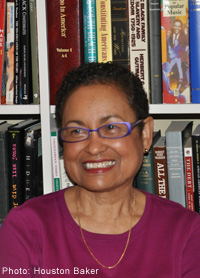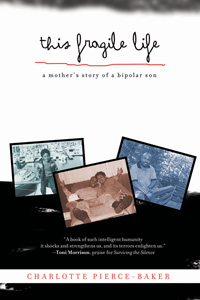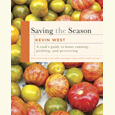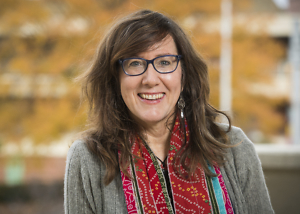Coming Out of the Shadows
In This Fragile Life, Vanderbilt professor Charlotte Pierce-Baker recounts her family’s long struggle with her son’s mental illness
Charlotte Pierce-Baker, a professor of Women’s and Gender Studies and English at Vanderbilt University, begins the first chapter of This Fragile Life: A Mother’s Story of a Bipolar Son by noting that her son Mark was “a gorgeous newborn.” This might seem a bland way to begin a memoir about mental illness: what mother doesn’t find her newborn gorgeous? But that observation conveys the happy innocence of any parent before a terrible illness befalls her child, an innocence that, as Pierce-Baker explains, can make it difficult to grasp what is happening even as the signs of illness become increasingly clear.
Clues of something amiss that appeared in Mark’s teen years were dismissed by Pierce-Baker and her husband, Houston Baker (also a Vanderbilt professor), as ordinary adolescent acting out. After Mark, born in 1971, had graduated from the University of Pennsylvania and moved to Los Angeles to attend the USC film school, they began to see his erratic behavior as pathological. In the years that followed, there were disappearances, violent episodes, substance abuse, arrests, and long spells of residential treatment for Mark. He also married twice and became a father. Throughout much of this time he wrote poetry, which Pierce-Baker includes in her memoir, thereby giving Mark a voice in the story. But This Fragile Life is very much Pierce-Baker’s own story, a highly personal account of a mother slowly coming to accept that her son’s life will always be constrained and challenged by mental illness, even as he remains the son she so loved as a beautiful newborn.
 This Fragile Life is not Pierce-Baker’s first exploration in print of her private struggles. In Surviving the Silence: Black Women’s Stories of Rape (1999), she writes in detail about the 1981 invasion of the family’s Philadelphia home by two armed men. The entire family, including ten-year-old Mark, was held captive at gunpoint, and Pierce-Baker was raped repeatedly. In both books, she writes with frankness and insight, allowing readers to make a connection between her experience and their own. Prior to a public reading at Vanderbilt on January 17, she answered questions from Chapter 16 by email;
This Fragile Life is not Pierce-Baker’s first exploration in print of her private struggles. In Surviving the Silence: Black Women’s Stories of Rape (1999), she writes in detail about the 1981 invasion of the family’s Philadelphia home by two armed men. The entire family, including ten-year-old Mark, was held captive at gunpoint, and Pierce-Baker was raped repeatedly. In both books, she writes with frankness and insight, allowing readers to make a connection between her experience and their own. Prior to a public reading at Vanderbilt on January 17, she answered questions from Chapter 16 by email;
Chapter 16: In both Surviving the Silence and This Fragile Life, you write about traumatic experiences that must have been difficult to revisit. Did you discover things during the writing that surprised you? Did the act of writing transform your understanding of your experience?
Charlotte Pierce-Baker: As I wrote—over the years—I learned more about myself and about our son. When I had an insight from my time with my therapist, or from insights from books or articles I read, I tried to bring new knowledge into my understanding of violence and illness, and the seeming randomness of both. As I grew in knowledge about the illness and our son’s challenges, some recalled incidents were extremely difficult to process. When our family history became too difficult to “re-live,” or if knowing the history from only my perspective compromised my vow to temporal truthfulness and personal integrity, I left that part out of the manuscript. I did not try to squeeze the reality of our son’s story of illness into some overarching narrative in order to make me feel better or wiser about the past or the present, or the forever illness of our son.
Chapter 16: In writing any memoir, there’s always the dilemma of how much to reveal about the people in your life. You used pseudonyms for your husband and son in Surviving the Silence, but not in This Fragile Life. What led to the different choice in the new book? In general, where do you draw the line on the privacy of others in your writing?
Pierce-Baker: I believe in privacy. Secrecy is another issue. I think it is always difficult to write about people who are living, and one must be careful to protect identities. My son, his wife, and my husband all gave permission to have their names used in This Fragile Life. With Surviving the Silence,, I used pseudonyms for all of the interviewees. My husband and son were fine with my using their names. However, as I wrote that book, I was still in the throes of PTSD. I could not bear to see my son’s or my husband’s name in print as I attempted to describe the horrific incidents of the book. Typing their names kept me from writing. By the end of the writing project, I was much better. But I decided not to go back and make changes. I wanted the reader to be “in the moment” with me as a writer and as a survivor.
 Chapter 16: In the book, you describe some trouble Mark had as a child with night terrors. Do you think now that those incidents might have been very early signs of illness in his case? What is your general view of the risks versus rewards of evaluating young children and teens for potential psychological problems?
Chapter 16: In the book, you describe some trouble Mark had as a child with night terrors. Do you think now that those incidents might have been very early signs of illness in his case? What is your general view of the risks versus rewards of evaluating young children and teens for potential psychological problems?
Pierce-Baker: I do not think Mark’s night terrors were early signs of his illness. I tell the story of his growing years to indicate he was an ordinary baby and toddler. I tell what I consider “my” truths so that parents will, hopefully, understand that they should not rush for medicines or hastily diagnose what seems unusual. In the end, it may be simply an ordinary child’s behavior. I do not believe in medicating young ones unless the symptoms are so severe that there is no other option. Children have sleepless nights; they are often “hyper”; they sometimes have “night terrors.” I believe we should allow our children to be children. I am not a physician so I cannot speak to the medical side of the issues. My chronicle of our parenting of Mark is meant only to suggest that the days and lives of parents always bring the unexpected and unexplained. It is perhaps better to project as many possible good futures as we can for our children and to read incessantly about caring for them. When we are blindsided by horrific and unfortunate realities (as in our son’s first psychotic break), we are compelled to seek answers, and we do not discount the past. That is the inevitable and impossible parental dilemma. I am still working to be a better mother.
Chapter 16: You include quite a few of Mark’s poems in the book, and it’s clear that his writing has been essential to him throughout his life. Do you think there should be a greater emphasis on creativity in school curricula, if only because that kind of expression seems to promote psychological well-being?
Pierce-Baker: We did not push Mark to become a writer—or to become creative in any way. He found his own sense of fulfillment and has always felt that writing and expressing himself—such as performing on stage—were desirable outlets. Our literary backgrounds were merely backdrops to his personal propensities. We have all enjoyed the sharing of writing. I do believe that creativity of many stamps is important in the school curricula. I am appalled that activities such as band, individual music lessons, drama, debate, and much more have been expunged from public-school curricula. Creative outlets promote self-worth.
Chapter 16: Looking back, what help do you wish had been available for your family that wasn’t? What, if anything, would have made it possible to see the signs of Mark’s illness sooner? What support could have made things easier for you and your husband?
Pierce-Baker: Looking back, I would have wanted available information. In 1996, no one in our circle of friends was willing to say, “Yes, I know this disorder. My family member is suffering with it. This is who you should call immediately.” We needed other parents/caregivers as supports. NAMI (National Alliance on Mental Illness) helped tremendously, but there were no ordinary, understanding people (for example, in the neighborhood) to talk with or to cry with. Today, I think we are beginning to come out of the shadows and out of our dark corners to talk openly with one another about mental illness. Shame/stigma/secrecy create silence. Silence can maim and kill. Knowing other sufferers would have helped tremendously.
Chapter 16: How do you think gender, race, and class shaped the evolution of Mark’s illness and treatment? What would have been different for him if he’d been white or female or the child of working-class parents?
Pierce-Baker: Bipolar Disorder crosses boundaries of race/class/nationality/gender/sexuality/ethnicity/ability. Bipolar Disorder is global. As with any complication of “differences,” bipolar disorder often abutted Mark’s issues with his categorization as “African American.” When Mark was compelled by his life situation to reside in public housing with his family, he suffered huge absence. There was a palpable lack, not only of dignified acknowledgment and respect, but also of treatment options. His resume is full of degrees from prestigious institutions, and he is gifted. However, to medical and health-care observers (and potential employers), he was nothing but a black guy living in public housing. He was, possibly, thought to be lethal. When Mark was jailed, he knew that if he had been other than African American, he might have received attentive medical scrutiny. He might have received effective and immediate medical diagnosis and treatment. Since my husband and I are above middle class in our work lives, “class” has worked to our advantage. We have been able to afford hospitalizations, rehabilitation, and recovery programs for Mark. We shall never stint on these for our son. But there are class, race, and economic issues that constitute barriers to effective mental health programming in the U.S. I believe our society must find better ways to provide information, treatment and care to those who are not privileged. No one should have to suffer mental illness without treatment or succor.
Chapter 16: You and your husband are both literary scholars, so I’m guessing there must be many books that have helped sustain you. What works of literature have you turned to during the worst times?
Pierce-Baker: Kay Redfield Jamison’s book, An Unquiet Mind, is the book I found first. I bought copies for all of our parents after doctors diagnosed Mark with bipolar disorder. The book is clear, intriguing, and honest. Dr. Jamison is a clinical psychologist with the disorder. What better explanation or endorsement? Our son, Mark, calls An Unquiet Mind “my other bible.”
Chapter 16: This Fragile Life is very much your personal story, and you steer clear of offering direct advice to other families dealing with mental illness. What do you hope readers will take away from the book?
Pierce-Baker: I want others to know that there are many of us “out here.” Sufferers and caregivers, alike. I want to help readers understand the horrors and the unpredictability of mental illness in its most profound manifestations—bipolar disorder, in particular. I want readers to know that mental illness for one person affects the entire family and those who share their friendships. I hope readers will understand that our son, Mark, with all of his difficulties and challenges, is a creative, engaging, loving man and father. It is possible to “have a life” with bipolar disorder. But that life must be supported by love, therapy, treatment, and medication. Having a mental illness does not mean you are not a productive citizen. True, every situation is different, but sometimes, with support and teamwork, you are able to give back two-fold: sometimes your poetry lights a life.
Charlotte Pierce-Baker will read from This Fragile Life: A Mother’s Story of a Bipolar Son at Vanderbilt University on January 17 at 7 p.m. in Wilson Hall, Room 126. The event is free and open to the public.
Fpsych



